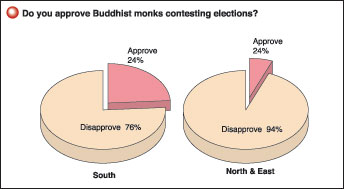| News |
||||
Opinion
polls: Issues facing a split nation This is the second part of an analysis of the findings of Wave 2 of the ORG-MARG SMART opinion poll series, The Pulse of the Nation. The first part of the Wave 2 which was exclusively made available to The Sunday Times was published last week. It dealt with questions pertaining to the peace processes and the state of the economy in addition to the performance of the UNF government. This week we publish the second instalment of Wave 2, which deals with issues ranging from monks in politics and the SLFP-JVP alliance to the media and the quality of life. Wave 2 was conducted from February 21 to 28. Overall as of February 28 this year, the vote seems to have a slight favourable lead towards the UPFA. However, with still over a month of campaigning after the above poll and with over 19% still undecided, it will be too early to arrive at a conclusion as yet. Please note that all ORG-MARG SMART polls are done with the objective of independently gauging the public opinion of the masses on current important issues concerning the country. The views portrayed here are inferences made from the findings only and does not in anyway reflect that of the pollster. The reader should keep in mind the margin of error of around 5% when making inferences from the findings reported herein. In other words, if the difference between two opinions are less than 5%, one cannot conclude that there is a favourable lead for any outcome, and instead should interpret the outcome as the two opinions are on par or equally preferred. The second wave of The Pulse of the Nation series has been conducted in the form of a sample survey of 2000 interviews in all 22 districts of the country including the North and East. Please note that the opinions of those Sri Lankan's living in the sample has been randomly drawn to represent all Sri Lankan's with respect to age, gender, ethnic group, religion, and geography and socio economic strata. While the results of the NE are reported separately (labelled NE) the results of the rest of the country are projected to represent the other 7 provinces (labelled as South). The first wave of this series was conducted during January 10-20 2004, which was before parliament was dissolved and elections were announced. The results of this poll were published during February 1-February 4. At that time, the consensus view was, while the people respected the President's actions of taking over some ministries, more than 80% wanted the PA President and the UNF Prime Minister to make compromises and put forward a joint effort to carry out the development plans for the country especially with respect to the North-East issue. At the time of this first wave, elections were not announced and hence no active campaigning was on. The second wave, the results of which are given hereunder, clearly shows an impact on public opinion after the election campaigning started. During the first wave, which was conducted before the elections were announced, there was a major split in opinion across the country. The split was happening in two ways, one with the people in the NE significantly differing in opinion to those in the South, while those in the South differing in opinion depending on their political affiliations on the issues relating to the political crisis. The results of our polls conducted over the years show that there was a clear acceptance of the UNP's ability to handle the economy and the SLFP/ PA government's ability to control crime, corruption etc. In 1994, the PA government was elected to power on a peace mandate, since from 1977-1994, people believed that while the UNP governments in power handled the economy well, they failed in finding a solution to the N-E problem. The PA rule from 1994-2000 saw the economy fall as well as no significant progress in finding a solution to the N-E issue. Hence, in 2001, once again the economic issue became the Most Important Issue and hence the UNF government was elected into power. However, the results of the 2004 polls clearly indicate that these long standing perceptions about the two major parties have taken a twist to the reverse. The people believe that for the first time the UNF government has failed in handling the economy but on the other hand has handled the N-E issue well. This is a clear indication that except for the people in the NE, there has been no trickle down effect of the economic turnaround of the country to the people at the grass roots levels. The good news to the UNF government is that the number one issue has now become the N-E issue and people believe that the UNF is the best party to handle this.
|
||||
Copyright © 2001 Wijeya Newspapers
Ltd. All rights reserved. |



